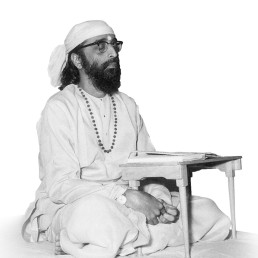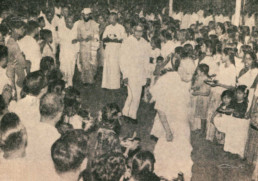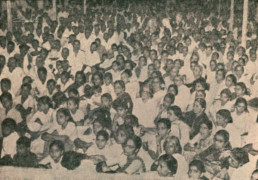
Jnana Yajna 49

Year & Dates:
December 07, 1958 to December 26, 1958

Yajna Topic:
Shrimad Bhagavad Gita- Chapter 5 & 6

Place:
Ernakulam, India.
The young children of Chinmaya Mission, Ernakulam, stood in two neat rows welcoming, with their lighted lamps; and when Pujya Gurudev walked amidst them, their sweet faces glowed even more. In the Durbar Hall grounds, where the Rajas of Kochi used to conduct their royal courts, the 49th Jnana Yajna was inaugurated by the Minister for Law (Kerala), Mr. Krishna Iyer, on the evening of December 7, 1958. After the minister spoke about the need for peace, liberty, and sarvodaya (the social and economic upliftment for all), Pujya Gurudev first pointed out that all the three could be achieved when the spiritual entity within each person is awakened.
The wakeup call is the immortal Shrimad Bhagavad Gita – Pujya Gurudev reminded that “its greatness lies not because it was sung by Lord Krishna, nor because it was written by a great Saint Vyasa, but because of the simple fact that it teaches man of the work-a-day world to live happily and intelligently.”
Joy-giving Renunciation
Pujya Gurudev Swami Chinmayananda was never tired of declaring Gita’s universal, timeless applicability. During that Gita Jnana Yajna too, every evening from 7:30 pm to 9 pm, He explained how selfless action precedes renunciation of action as said by Bhagavan Krishna in the verses of Chapter 5. He detailed the preparatory process for meditation as laid out in chapter 6. When He dramatized the process of focusing one’s gaze between the brows, the audience laughed heartily. When He made them experience the power of quieting their bodies, minds, and intellects in the hush of meditation, they were astounded.
The 49th Yajna was conducted during the same days as the 50th Yajna in the nearby town of Thrippunithura. He taught Vivekachoodamani during the mornings from 7:30 am to 8:30 am and His discourses on Gita from 7:30 pm to 9 pm took place at Ernakulam after He completed the Atma Bodha discourses earlier that evening at Thrippunithura. The ease with which He switched from text to text astonished both the scholar and the novice in the crowds that moved from yajnashala to yajnashala with Him.
The audience of both towns participated in a divinely invigorating Vishnu Sahasranama Laksharchana that was held in Tripunithura on December 14th. It was the first Jnana Yajna where the sacred Vishnu Sahasranama (the thousand names of Bhagavan Vishnu) was chanted all day by devotees while ardent puja was offered extolling His infinite attributes.
The 49th yajna concluded after the Akhanda Kirtan, the Gita Havan, and the Avabhrta snaana at the Kovalam beach near Trivandrum. When the children of the mission presented a program of entertainment on the eve of December 26th, Pujya Gurudev was delighted. The hearts of the seekers of Ernakulam were left to meditate on the selfless joy and knowledge taught by a supreme renunciate.
Photo Gallery

“Think,” Says Pujya Gurudev
If comparison and contrast are the methods ‘of knowing’ for the mind-and-intellect instrument, then to renounce them is to renounce the vehicle. A car is a vehicle that moves on earth. It cannot be used in water. Thus, if I am sailing on the ocean, certainly I am not moving in the car, but I am using a vehicle that can float on the waters. In the field of plurality where compassion and contrast are possible I can use a vehicle of the intellect-and-mind. The stanza here states that he is a true Sanyasi who has gone beyond the perception of contrast, which necessarily means that he is one who has transcended the inner instrument of mind-and-intellect.
From Tyagi Magazine
A meditator invariably finds it difficult to scale into the higher realms of experience due to a sheer psychological fear-complex. As the Yogin slowly and steadily gets himself unwound from his sensuous vasanas, he gets himself released, as it were, from the cruel embrace of his own mental octopus. At this moment of transcendence the unprepared seeker feels himself mortally afraid of the thought that he is getting himself dissolved away into ’nothingness’. The ego, in its long habits of living in close proximity with its own limitations, finds it hard even to believe that there is an existence Supreme, Divine and Infinite. One is reminded of the story of the stranded fisher-women who complained that they could not get any sleep at all that day when they had to spend the night in a perfumery-shop, till they put their baskets very near their nose! Away from our pains we dread to enter Infinite Bliss!
From Tyagi Magazine
Hammer it in!
How do the repeated teachings of ancient wisdom work to dispel misconceptions and introduce profound knowledge? Can we uncover the transformative journey from misconception to enlightenment through these teachings? And how do the paths of Sankhya and Karma Yoga converge to guide seekers towards a higher state of consciousness and understanding? Join us as we explore these questions and delve into the timeless wisdom of the ages.



